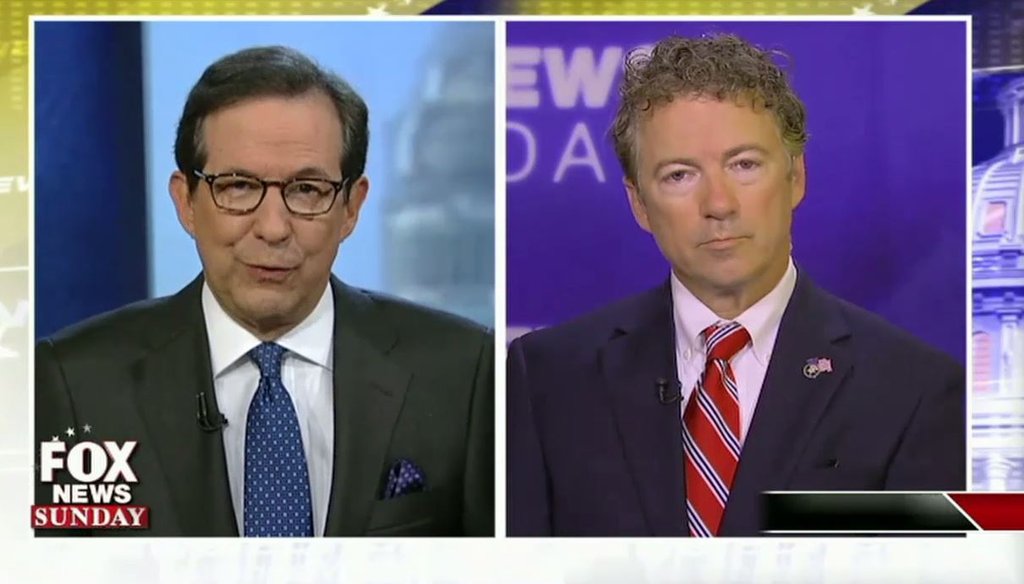Stand up for the facts!
Our only agenda is to publish the truth so you can be an informed participant in democracy.
We need your help.
I would like to contribute

Sen. Rand Paul, R-Ky., attacked Hillary Clinton and Planned Parenthood in a July 26 interview with Chris Wallace on "Fox News Sunday." (Screengrab)
Republican presidential candidates turned their fire away from each other and toward Democratic frontrunner Hillary Clinton on Sunday over her use of personal email while secretary of state.
Clinton’s emails are again under scrutiny after federal investigators said Friday that her account contained classified information and should not have been stored on a private server. Clinton had denied that her personal server carried messages with classified information, and it’s not clear if the messages were classified after the fact, as her campaign argues, or whether she knew they were classified at the time.
The Justice Department has not decided whether it will pursue a criminal investigation, according to the New York Times.
In a phone interview with Jake Tapper of CNN’s State of the Union, Donald Trump called Clinton’s action unquestionably "criminal." U.S. Sen. Rand Paul, R-Ky., didn’t quite go that far.
"Even she knew they had a rule," Paul said. "They actually admonished one of her ambassadors because he wasn’t using the proper server. So I don't understand how she can skate by and act as if she really wasn't aware of the law."
Sign up for PolitiFact texts
Did Clinton’s State Department really "admonish" a U.S. ambassador because he wasn’t using the proper server for email? That rates True.
Paul is referencing the 2012 resignation of the U.S. ambassador to Kenya, Scott Gration. Gration, a retired Air Force general and former adviser to President Barack Obama, resigned his post after less than a year and a half on the job and right before the release of an unflattering internal management audit by the State Department’s Office of Inspector General.
In his resignation letter, Gration faulted "differences with Washington regarding my leadership style, and certain priorities lead me to believe that it’s now time to leave."
The audit cast those "differences" more severely — mainly finding Gration was severely deficient as a leader.
Among his many failings was his continued usage of a personal email, according to the report.
Gration’s drama resurfaced when the Clinton email controversy first erupted in March 2015, and some claimed Gration was fired for his "Hillary-like" use of email. Gration himself called the State Department’s treatment of him a double standard.
Compared to his general incompetence, the email issue played a minor role. Gration’s grating style of management, uncooperative attitude and "disruptive" initiatives were more pressing to the State Department. Out of more than 80 mission chiefs, he ranked last for interpersonal relations, next to last on managerial skill and attention to morale, and third to last on overall scores, according to the audit.
Gration deliberately defied the State Department’s rule on communication by installing a commercial Internet connection in his embassy office bathroom and authorizing his embassy staff to use personal emails, according to the report.
"He has willfully disregarded Department regulations on the use of commercial email for official government business," the report says.
The report also spells out the reasons for the policy: Unauthorized systems increase the risk for hacks and loss of records. It then states that the use of personal emails "must be limited to maintaining communications during emergencies" and recommends the embassy stop using the unofficial email accounts. (Gration was using a Gmail account.)
It is unclear if top State Department brass slammed Gration for violating the personal email policy, as Paul suggests. We found no on-the-record condemnations from department officials, though Gration said multiple times that Clinton’s chief of staff fired him after reading the report. An audit by an inspector general is different than Clinton directly criticizing Gration for the practice.
Still, Clinton should have been leading by example, said Douglas Cox, a law professor at the City University of New York, who studies records preservation
"The similarities between the two situations are striking, and it is fair to compare them," Cox said. "Both were in senior leadership positions. Both made a regrettable decision to use non-official email, which raised security and record-keeping concerns that should have been obvious. And both refused to accept that their continuous use of non-official email violated State Department rules."
Our Sources
See story.








































